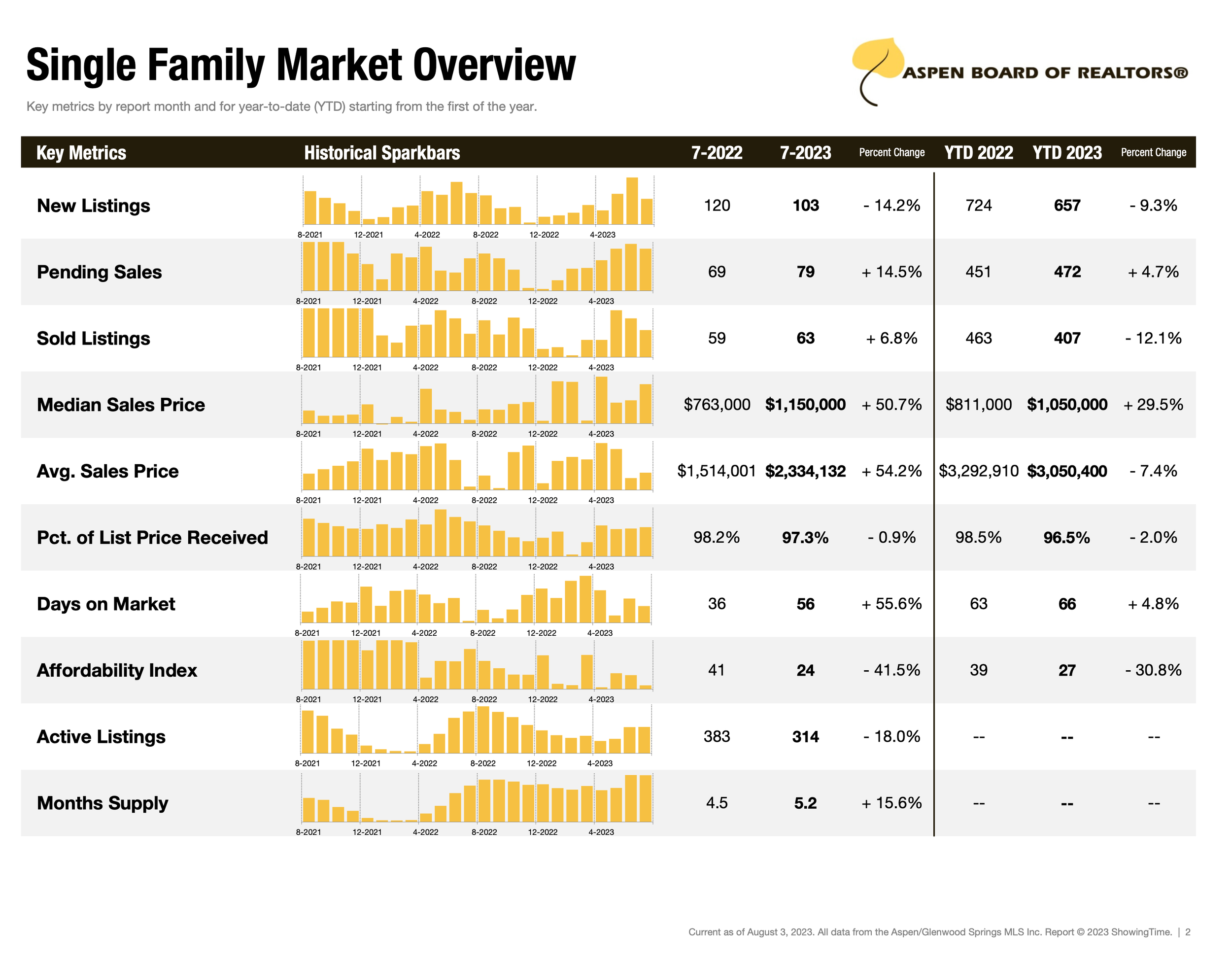August 2023 Market Stats - How to get yourself a DEAL!
With an affordability index at 27 (extremely low), and a median sales price over a million dollars across the area, it’s pretty obvious that the driver of this market is not local wages. If anything, it might be the opposite. The real estate market is one of the main drivers of the local economy and its wages. Construction, sales, property management, ranted income, insurance, repairs… If local workers have a hard time finding housing, a lot of us also live directly or indirectly from the real estate industry. And our local real estate is booming. If other areas seem to be coming off of their COVID highs, the Roaring Fork Valley is still steaming ahead, with a median sales price up almost 30% year to date compared to last year.
How cash buyers set the price: there is only enough inventory for them
Seeing such price growth might seem surprising knowing that the interest rates have been rising at their fastest pace in history lately. And you have to wonder: with an affordability index of 27, who is buying those homes? If the top of the income bracket in each town might be scooping up a few sales, most of the buyers come from out of town or are only part time residents. And they buy mostly with cash. Their income might not be declared here locally. So it doesn’t matter what the wages are. This, de facto, skews the affordability index calculation and might create the illusion of unsustainable market conditions. Also - cash buyers are less sensitive to interest rates by definition. Looking at it this way, the current level of prices starts making more sense.
So - who are these cash heavy buyers? Some of them might have just sold a home, and high prices are just a feedback loop then. High prices created high purchasing power for the seller after closing. Others come from out of town, they have been visiting Aspen and the area, and want to purchase a home as a second home or move into the Valley. Some come from the front range, and want out of the Denver area and escape the crowds.
These cash buyers have always been around, but they didn’t make up for the largest part of the buyer’s pool until the inventory became so scarce. Then they became the only game in town: with the number of listings being in the double or even single digits for each town, there is just enough for sale to quench the thirst of these cash heavy buyers specifically. With a higher purchasing power than most locals, these buyers will always be served first. Once the inventory becomes higher than what these buyers can absorb, prices will decline. The question is: will it ever happen?
Oversupply at the neighborhood level
The answer is yes, but not to the scale you might expect. The oversupply is happening, but at a very small scale. And this is how to find the deals. You can find homes for sale for less than you would have bought them a year ago, despite the median price being up in the area as a whole. You just have to look closely at the ultra local level. But first, let’s pay attention to the “cash heavy buyer’s” psychology.
With this type of buyer (dismissing the ones who are cash heavy because they just sold a home), it’s a market of “want”, not a market of “need”. If they want, then they usually try to make sure they are not catching a falling knife. Is it a good investment? Am I being part of the craze? Am I overpaying? In this context, this is how you get a deal: find the listings that went poorly, and make an offer on those listings themselves, or on comparable ones. Some listings were listed too high, right when interest rates started to go up. They’ve been listed for a while, implemented price reductions, but they kept chasing the market down. Temporarily, they create a feeling of a downward pressure on price in a specific area. Maybe even just at the neighborhood level. That’s where a buyer can have some leverage despite the market being clearly up.
This is how you find a DEAL!
Looking for a deal in this HOT market? Don’t wait for properties to get listed for a low price! Those will fly off the shelf. The market is still hot. Look for the ones that were listed too high a few months ago, and the houses that are comparable to them. If the sellers are motivated, they might feel like time is not on their side. There is an opportunity for the buyer to find some leverage there. Overall the market is hot and will remain hot for the time being. There is no wave of distressed sellers and cheap deals shaping up. But by drilling down on the very local level, and finding little pockets of struggling listings, you might be able to find great deals. In this market more than ever being “fearful where others are greedy, and greedy where others are fearful”, will pay off!
Breakdown per town below.















